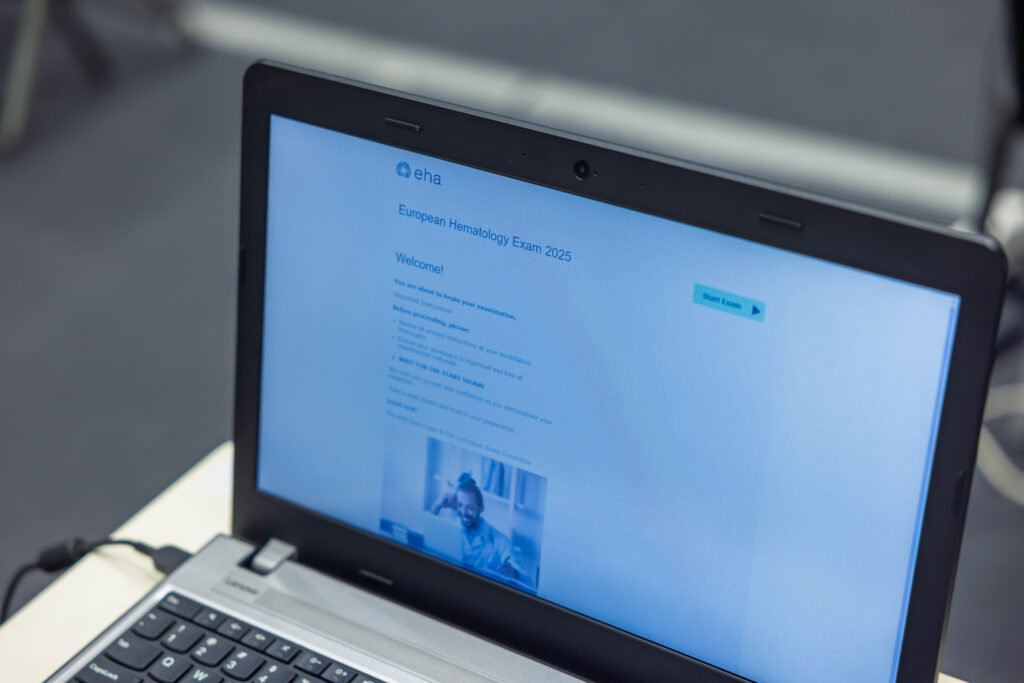
EHA Exam 2026
What is the EHA exam?
The European Hematology Exam, is an annual assessment which aims to certify excellent knowledge according to the criteria and topics of the European Hematology Curriculum.
- Consists of 100 multiple choice questions in English
- Covers all 8 sections of the European Hematology Curriculum
- Takes 2.5 hours
- Upon passing the European Hematology Exam, participants receive an EHA certificate. This extra ‘quality stamp’ complements the official right to practice that’s granted by your national authority.
Why take the EHA exam?
The exam is mainly aimed at hematologists who have just finalized their specialty training. It’s also open to mid-career and senior hematologists who would like to check if their knowledge is still up to date.
Benefits:
- International recognition for your hematology expertise.
- Opportunity for international mobility for hematologists.
- Enhances career opportunities and professional credibility.
- Align with European Hematology Curriculum standards.
Depending on country of practice:
- EHA Exam integrates with national certification pathways.
- Increases opportunities to access research grants.
- Official exam in Switzerland.
- Part of final assessment (grade) in some countries.
Registration 2026
Registration will be open from March 16 to April 19, 2026. The registration link will be published here.
Registering for the European Hematology Exam is a simple online process. Below you’ll find everything you need to know about what information is required, how fees work, and available exam locations. For the registration, make sure to have in hand:
- Personal contact information & professional details
- EHA membership account (if applicable)
- ID/Passport
- Payment information (Debit/debit or bank transfer)
Exam Fees
Registration fees vary depending on your EHA membership status and whether you take the exam in person or remote via online proctoring. Moreover, we provice a discount fee for LMIC_Guidelines. Please note that all fees include VAT.
| Member | Non Member | |
| LMIC | € 50 | € 100 |
| On-site/ In person | € 100 | € 150 |
| Remote/Online | € 150 | € 250 |
The European Hematology Exam is offered in multiple formats to ensure candidates worldwide can participate in the way that best suits their situation.
- Congress Session (In-Person)
Candidates may choose to take the exam in person at the EHA2026 Congress in Stockholm, Sweden. At the congress, a central exam session will run simultaneously with local sessions worldwide. This session is available for everyone, independent of country of origin. In case a visa is needed to participate, candidates may request a letter from EHA during the exam registration process.
- Local Exam Sessions (In‑Person)
Each year, EHA collaborates with national societies across several regions to host local, in‑person exam sessions. These locations provide a proctored environment, allow candidates to connect with peers, and offer an experience aligned with national society support. Additional details—such as venue name, address, and local starting time—will be communicated via email after registration.The following locations will be available this year:
Country City Argentina Buenos Aires Brazil São Paulo Bulgaria Sofia Chile Santiago Colombia Bogota Croatia Zagreb Egypt Cairo France Paris Greece Athens Iraq Baghdad Jordan Amman Kazakhstan Astana Mexico Mexico City Morocco Casablanca Pakistan Rawalpindi/Islamabad Peru Lima Portugal Lisbon Republic of North Macedonia (to be announced) Saudi Arabia Riyadh Spain Madrid Switzerland Bern Taiwan Taipei Turkey Ankara - Remote (Online) Exam Option
For candidates who cannot reach a local session, the exam can also be taken remotely from home, following strict online‑proctoring guidelines. While this option provides accessibility and flexibility, EHA recommends choosing an in‑person session whenever possible to benefit from the structured environment and peer interaction. Learn more on how to prepare and what to expect for this option in the exam preparation section of this page
Exam preparation
Preparing for the EHA Exam is an important part of your success, and we are here to support you throughout this process. In this section, you will find a range of resources to help you study effectively, understand what to expect, and feel confident on exam day.
Preparing for the European Hematology Exam is easier and more effective when you make use of the comprehensive learning ecosystem developed by EHA. All EHA resources are built around the European Hematology Curriculum, ensuring full alignment with the knowledge and competencies assessed in the exam.
Below you will find the most valuable tools to help you prepare with confidence.
- European Hematology Curriculum:
The Curriculum outlines the essential knowledge every hematologist in Europe is expected to master. Use the Curriculum as your study roadmap, reviewing each topic and identifying where you may need additional learning. - Progress Test:
Held twice yearly (March & November), the EHA Progress Test is modeled on previous European Hematology Exams and provides immediate feedback on your answers. The Progress Test:- Reveals your strengths and weaknesses
- Helps you adjust your study plan
- Provides you with an insight on the format of the exam
- Strongly correlates with success—78% of 2024 Progress Test takers passed the European Hematology Exam
- EHA Campus: Your Online Learning Hub
EHA Campus offers a large range of accredited, interactive e-learning courses fully aligned with the European Hematology Curriculum. Courses include clinical cases, disease‑area modules, transfusion topics, and more. Perfect for targeted learning, the platform allows you to study at your own pace using trusted, expertly curated content. - Micro-learnings & Podcast
If you prefer learning on the go in an engaging and flexible way, EHA also offers bite‑sized microlearning through EHA Education social media & expert‑led episodes on the EHA Unplugged podcast channel, featuring guideline updates, clinical insight, and scientific discussions.
– Test your equipment:
Run the system check to confirm that your computer, webcam, microphone, and internet connection meet the technical requirements.
– Set up your exam space:
Choose a quiet, private room and ensure your desk area is clear. You will be asked to show the room and workspace during check‑in.
– Install required tools: You will need to download the required browser/ proctoring components and follow the onboarding steps sent to you prior to the exam. All the required information on how to do it are here.
– Follow the check‑in process:
At the start of your exam, the proctor will verify your identity, review the exam rules with you, and conduct a remote system check before unlocking your exam. If issues arise, live support is available throughout the session.
Exam Quality Assurance
EHA is committed to ensuring that the European Hematology Exam is fair, reliable, and scientifically robust. To achieve this, a multi‑layered quality assurance process is in place, combining expert content development with independent psychometric evaluation.
The exam content is created by a dedicated Question Writers Group, composed of experienced hematologists who are trained in evidence‑based question‑writing methodologies. Their task is to develop items that:
- Meet high scientific and educational standards
- Align with the European recommended level
- Reflect the full breadth of the European Hematology Curriculum
Once drafted, all questions undergo an independent reassessment by a separate Review Group, ensuring that the final selection represents all curriculum sections and adheres to EHA’s quality criteria.
To maintain objectivity and exam reliability, EHA collaborates with Cito, an internationally recognized institute specializing in educational measurement. Cito provides an independent judgment on the overall quality of the exam, as well as, the definition of the passing score.
After each exam session, Cito’s Psychometric Research and Knowledge Center conducts a comprehensive psychometric analysis. This includes evaluating:
- Item quality using Rit/Rir correlations to determine how well each question discriminates between higher‑ and lower‑performing candidates
- P‑values (answer popularity) to identify unexpected response patterns
- Reliability measures, such as Cronbach’s alpha and Guttman’s lambda‑2, ensuring the exam meets accepted standards for high‑stakes assessments
When necessary, questions showing ambiguous or region‑dependent interpretations are re‑evaluated by experts, and items may be removed or adjusted to preserve fairness.
Update on the 2025 exam
The 9th European Hematology Exam took place on June 12, 2025.
The main exam session was held during the EHA2025 Hybrid Congress in Milan, Italy. Local parallel exam sessions, organized in partnership with national hematology societies, were held in 19 countries.
We’ll share further updates and a full report on the 2025 exam shortly. In the meantime, the following round-up provides some key statistics and information.
Please note that we will not share the answers to any of the exam questions.
Exam performance
The current average score among candidates is 65%. However, this figure may change as we’re still analyzing the results.
-
287
Total registrations
-
45
Countries represented
-
93%
Attendance rate
Contact information
EHA Executive Office
Koninginnegracht 12b
2514 AA The Hague
The Netherlands
Phone: +31 (0)70 3020 099
Email: exam@ehaweb.org
